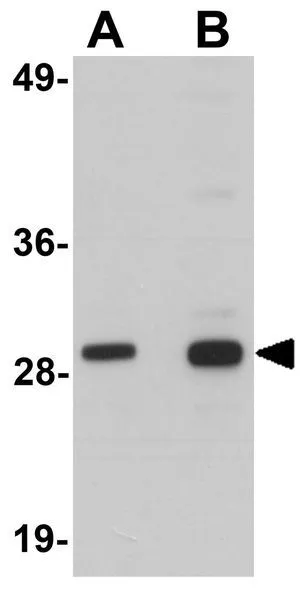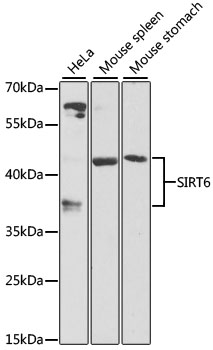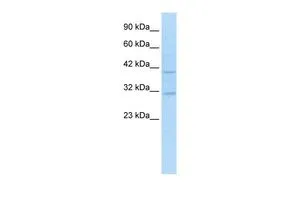
WB analysis of HeLa cell lysate using GTX17089 SIRT6 antibody. Working concentration : (A) 0.5 and (B) 1 μg/ml
SIRT6 antibody
GTX17089
ApplicationsWestern Blot, ELISA
Product group Antibodies
ReactivityHuman, Mouse, Rat
TargetSIRT6
Overview
- SupplierGeneTex
- Product NameSIRT6 antibody
- Delivery Days Customer9
- Application Supplier NoteWB: 0.5 - 1 microg/mL. *Optimal dilutions/concentrations should be determined by the researcher.Not tested in other applications.
- ApplicationsWestern Blot, ELISA
- CertificationResearch Use Only
- ClonalityPolyclonal
- Concentration1 mg/ml
- ConjugateUnconjugated
- Gene ID51548
- Target nameSIRT6
- Target descriptionsirtuin 6
- Target synonymsSIR2L6, hSIRT6, NAD-dependent protein deacylase sirtuin-6, NAD-dependent protein deacetylase sirtuin-6, SIR2-like protein 6, protein mono-ADP-ribosyltransferase sirtuin-6, regulatory protein SIR2 homolog 6, sir2-related protein type 6, sirtuin type 6
- HostChicken
- IsotypeIgY
- Protein IDQ8N6T7
- Protein NameNAD-dependent protein deacylase sirtuin-6
- Scientific DescriptionThis gene encodes a member of the sirtuin family of proteins, homologs to the yeast Sir2 protein. Members of the sirtuin family are characterized by a sirtuin core domain and grouped into four classes. The functions of human sirtuins have not yet been determined; however, yeast sirtuin proteins are known to regulate epigenetic gene silencing and suppress recombination of rDNA. Studies suggest that the human sirtuins may function as intracellular regulatory proteins with mono-ADP-ribosyltransferase activity. The protein encoded by this gene is included in class IV of the sirtuin family. Alternative splicing results in multiple transcript variants.[provided by RefSeq, Jul 2010]
- ReactivityHuman, Mouse, Rat
- Storage Instruction-20°C or -80°C,2°C to 8°C
- UNSPSC41116161







